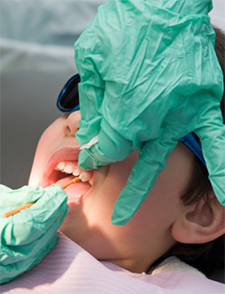Understanding Pediatric Fluoride Treatment
 It’s undeniable that fluoride has played a major role in the decline of dental cavities in the United States. However, what isn’t so clear to many parents is whether or not fluoride treatments are safe and/or beneficial for children.
It’s undeniable that fluoride has played a major role in the decline of dental cavities in the United States. However, what isn’t so clear to many parents is whether or not fluoride treatments are safe and/or beneficial for children.
After all, children receive fluoride on a regular basis from many different types of foods and even water. Through these sources alone, minerals lost due to plaque, bacteria, and sugars are remineralized on teeth.
So, is an additional fluoride treatment at the dentist necessary and if so, at what age are the treatments most beneficial? Read on to find out.
Why You Should Consider Fluoride Treatments for Your Child
While it’s true that fluoride found in foods and water can replace lost minerals, it sometimes isn’t enough to strengthen teeth and protect against cavities. In fact, if you don’t consume enough natural fluoride, demineralization will occur much more quickly than remineralization, leaving enamel at risk and causing tooth decay.
Fluoride treatments speed up the natural remineralization process, providing prolonged protection against demineralization and related tooth decay. They are particularly effective in children because they can reverse early decay while protecting permanent teeth as they develop.
Scheduling Your Child’s Fluoride Treatments
Children should start fluoride treatments at around 6 months of age and continue at least until they turn 16 (and ideally, beyond this age as well). Treatments vary based on age and also on whether they are done at home or at the dentist’s office:
-
- Drops, Chewables, Tablets, or Lozenges – These treatments are typically used at home for children 6 months and older who don’t receive enough fluoride in their water.
-
- Fluoride Toothpaste – After the age of two, children’s teeth should be brushed using a pea-sized amount of toothpaste with fluoride.
-
- Fluoride Varnish – Once baby teeth have appeared, children should have a fluoride varnish applied to protect against tooth decay. Typically, varnishes are applied by a dentist twice per year for children two and older.
-
- Gels and Foams – As children get older, a dentist commonly applies gel or foam fluoride treatments using a mouth guard. This typically takes about five minutes.
- Mouth Rinses – A fluoride mouth rinse may be prescribed for children over 6 years of age who are at risk for tooth decay due to genetics or other factors. A mouth rinse is typically used in combination with other fluoride treatments.
Protecting Your Child from Too Much Fluoride
The most common concern about fluoride treatments is that large amounts can be toxic to the brain, bones, kidney, and thyroid. However, products intended for home use have extremely low levels of fluoride, meaning that you generally don’t have to worry.
Still, there are precautions you can take to ensure you’re not only keeping potentially dangerous products away from children, but also using fluoride properly:
- Store any fluoride supplements or products out of reach of young children.
- Use limited amounts of fluoridated toothpaste on a child’s toothbrush.
- Don’t allow children to use fluoridated toothpaste without supervision until the age of 6.
Fluoride Treatments Play a Vital Part in Your Child’s Smile
Although some parents view fluoride skeptically, professional treatments are integral to your child’s smile starting at 2 years of age.
By doing your part at home and scheduling regular appointments, you can help prevent cavities and give children the strong teeth they need both now and in the future.
Sources:
Dental Health and Fluoride Treatment. (2014, October 9). Retrieved on June 3, 2015 from http://www.webmd.com/oral-health/guide/fluoride-treatment
Guideline on Fluoride Therapy. (2014). Retrieved June 3, 2015 from http://www.aapd.org/media/Policies_Guidelines/G_fluoridetherapy.pdf
Reinberg. S. (2014, May 6). Docs Should Give Toddlers Fluoride Treatments: Panel. Retrieved on June 3, 2015 from http://www.webmd.com/parenting/news/20140506/doctors-should-give-toddlers-fluoride-treatments-us-task-force

